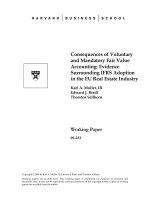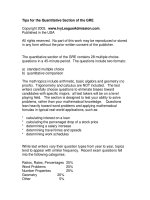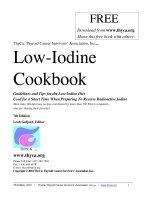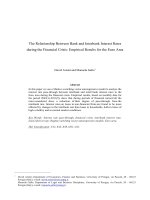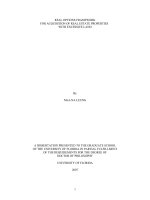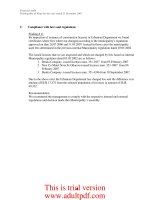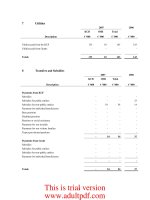81 financial and tax tips for the canadian real estate investor expert money saving advice on accounting and tax planning 2
Bạn đang xem bản rút gọn của tài liệu. Xem và tải ngay bản đầy đủ của tài liệu tại đây (3.41 MB, 237 trang )
Table of Contents
Praise
Also by Don R. Campbell
Title Page
Copyright Page
Introduction
IT’S NOT HOW MUCH YOU MAKE — IT’S HOW MUCH YOU KEEP — THAT MATTERS
THIS KNOWLEDGE IS YOUR RESPONSIBILITY — NOT YOUR ACCOUNTANT’S
NO THEORY, JUST REAL LIFE
PART 1
TIP #1: THE TRUTH ABOUT DEATH AND TAXES.
TIP #2: ASSEMBLE YOUR TEAM.
TIP #3: HIRE A QUALIFIED ACCOUNTANT
TIP #4: GET TO KNOW HOW THE PROCESS OF AN ACCOUNTING PRACTICE WORKS.
WHY DOES IT COST SO MUCH?
TIP #5: THERE ARE QUESTIONS YOU SHOULD NOT ASK YOUR ACCOUNTANT.
TIP #6: LEARN TO READ FINANCIAL STATEMENTS.
TIP #7: CHOOSE AND USE A RECORD-KEEPING SYSTEM.
KEEPING FINANCIAL RECORDS
TIP #8: ALL RECORD-KEEPING PROGRAMS ARE NOT CREATED EQUAL.
TIP #9: KNOW WHEN TO TRANSITION FROM DIY TO BOOKKEEPER AND
ACCOUNTANT.
TIP #10: KEEP IT SIMPLE. KEEP IT UP TO DATE!
PART 2
TIP #11: COLLECT INFORMATION, NOT STORIES.
TIP #12: FORGET FAIRNESS. IT’S ABOUT THE RULES.
TIP #13: NEVER THINK YOU’RE SPECIAL!
TIP #14: REVIEW LEGAL AGREEMENTS FOR TAX CONSIDERATIONS.
TIP #15: YOUR HOME IS YOUR CASTLE.
HOW LONG IS ENOUGH?
TIP #16: ONCE YOU DECIDE WHO OWNS THE PROPERTY, YOU CAN’T CHANGE IT.
A TAX PERSPECTIVE
TIP # 17: INCORPORATING MY BUSINESS MAKES SENSE WHEN ...
PART 3
TIP #18: PICK THE RIGHT BANK ACCOUNT.
TIP: #19: GET A SEPARATE BANK ACCOUNT FOR YOUR INVESTMENT BUSINESS.
TIP #20: IDENTIFY EVERY DEPOSIT.
TIP #21: MANAGE YOUR BANK ACCOUNTS WITH CARE.
TIP #22: SAVE THE STATEMENTS OF ADJUSTMENT AND TRUST LEDGER
STATEMENTS FOR YOUR ACCOUNTANT.
TIP #23: KEEP YOUR RECORDS CLEAN.
TIP #24: RECORD LOAN PRINCIPAL AT THE TIME OF FINANCING.
TIP #25: EMBRACE TECHNOLOGY THAT REDUCES RECORD-KEEPING ERRORS.
TIP #26: KEEP PERMANENT FILES.
NOTICE OF REASSESSMENT
PERMISSION TO DESTROY
ACCIDENTAL LOSS
TIP #27: COLOUR-CODE YOUR FILING SYSTEM.
RED: TENANT INFORMATION
YELLOW: PROPERTY MISCELLANEOUS
BLUE: LEGAL DOCUMENTS
GREEN: ONGOING MONTHLY RECEIPTS
REPLICABLE RECORD
TIP #28: PROTECT YOURSELF FROM FRAUD.
TIP #29: PULL ALL OF THESE RECORD-KEEPING TIPS TOGETHER.
TIP #30: GO ONE STEP FURTHER AND CREATE A VIRTUAL OFFICE.
PART 4
TIP #31: RECEIPTS MATTER.
AlM FOR CONSISTENCY
TIP #32: EXPENSES ARE REAL, NOT CREATED.
PAYING MEMBERS OF YOUR FAMILY
TIP #33: KNOW HOW TO DEFINE YOUR EXPENSES.
DIRECT EXPENSES
INDIRECT EXPENSES
PERSONAL EXPENSES
TIP #34: REMEMBER TO CLAIM YOUR INDIRECT EXPENSES.
TIP #35: REPAIRS AND IMPROVEMENTS ARE NOT THE SAME THING WITH RESPECT
TO A ...
REVIEW THE RULES
AN ISSUE OF TIMING
TIP #36: PURCHASE YOUR CAR PERSONALLY.
BUY YOUR CAR PERSONALLY
TIP #37: YOU CAN DEDUCT FINANCING COSTS.
TIP #38: A LOAN CAN BE INTEREST DEDUCTIBLE.
THE PAY-OFF STRATEGY
HOW DO YOU MAKE THE LOAN TAX DEDUCTIBLE?
TIP #39: DOCUMENTATION IS KEY TO DEDUCTING INTEREST.
TIP #40: CLOSING DOCUMENTS INCLUDE ITEMS WITH UNIQUE TAX
CONSEQUENCES.
TIP #41: SEGREGATE PRINCIPAL AND INTEREST FOR MORTGAGE PAYMENTS.
TIP #42: KNOW WHAT TO DO IF YOU’VE MISSED A TAX DEDUCTION OR TAX
CREDIT.
CONSIDER YOUR OPTIONS
PART 5
TIP #43: FILE AND PAY YOUR TAXES ON TIME.
TIP #44: KNOW YOUR TAX DEADLINES.
TAX PAYABLE AND PAYMENTS
TIP #45: GET YOUR EMPLOYEE STATUS DEFINITIONS STRAIGHT.
TIP #46: UNDERSTAND THE CONCEPT OF MARGINAL TAXES.
TIP #47: PUT YOUR MARGINAL TAX RATE TO WORK.
TIP #48: KNOW THE DIFFERENCE BETWEEN A TAX CREDIT AND A TAX
DEDUCTION.
TIP #49: DIVIDE TAXABLE INCOME WITH INCOME SPLITTING.
TIP #50: PAY FAMILY MEMBERS.
TIP #S 1: FILE T4s AND T5s ON TIME.
TIP #52: FORMAL REPORTING IS ESPECIALLY IMPORTANT WHEN DEALING WITH
FAMILY MEMBERS.
TIP #53: CAPITAL GAIN AND INCOME ARE NOT THE SAME THING.
TIP #54: WHEN IT COMES TO CAPITAL GAINS, INTENTION MATTERS.
TIP #55: LOOK FOR WAYS TO PROVE YOUR PRIMARY INTENTION.
TIP #56: THE CRA WILL “LOOK BEHIND THE CURTAIN” FOR A BACKUP PLAN!
POINTS TO CONSIDER
TIP #57: GET TO KNOW THE CONCEPT OF CAPITAL COST ALLOWANCE.
CCA AND REAL ESTATE
TIP #58: MAKE CAPITAL COST ALLOWANCE WORK FOR YOU.
TIP #59: You will BE AUDITED.
TIP #60: AVOID UNNECESSARY CONFLICT WITH THE AUDITOR.
TIP #61: RECONSIDER SELF-REPRESENTATION.
TIP #62: RULE BREAKERS INVITE SCRUTINY.
THIRD-PARTY INFORMATION
TIP #63: STATUTES OF LIMITATIONS ON AUDITS.
GST IS DIFFERENT
PERMANENT RECORDS
PART 6
TIP #64:MONITOR YOUR CAPITAL DIVIDEND ACCOUNT.
TIP #65: THERE MAY BE TAX IMPLICATIONS TO REFINANCING A PROPERTY.
TIP #66: USE RDTOH TO CUT CORPORATE TAXES.
WHAT DO YOU NEED TO KNOW?
TIP #67: YOU CAN TRANSFER PERSONALLY OWNED REAL ESTATE TO A
CORPORATION THROUGH ...
TIP #68: THERE ARE BETTER WAYS TO TRANSFER PROPERTY TO A FAMILY
MEMBER.
TIP #69: SPOUSAL TRANSFER OF OWNERSHIP PERCENTAGES CAN TRIGGER OTHER
TAXES.
TIP #70: KNOW WHAT TRIGGERS THE ATTRIBUTION RULES WITH REAL ESTATE.
HERE’S WHAT YOU NEED TO KNOW
TIP #71: OFFER THE VENDOR A TAX DEFERRAL IF THE VENDOR TAKES BACK A
MORTGAGE.
TIP # 72: FIGURE OUT HOW TO MAKE THE MORTGAGE ON YOUR HOME TAX
DEDUCTIBLE.
TIP #73: DIFFERENT GST RULES MAY APPLY.
NEW RESIDENTIAL RENTAL REBATE
APPLICATION GUIDELINES
TIP #74: UNDERSTAND HOW A FAMILY TRUST IS TAXED.
TIP #75: THERE ARE THREE PRIMARY REASONS TO CREATE A FAMILY TRUST.
TIP #76: A FAMILY TRUST LETS MINORS BENEFIT FROM THE OWNERSHIP OF
ASSETS THEY ...
TIP #77: THERE ARE FOREIGN AND DOMESTIC TAX IMPLICATIONS TO BUYING
FOREIGN REAL ESTATE.
TIP #78: IF YOU PLAN TO LEAVE CANADA, BECOME A NON-RESIDENT FOR TAX
PURPOSES.
TIP #79: NON-RESIDENT INVESTORS NEED HELP WITH NON-RESIDENT RULES.
SELLING IS EVEN MORE COMPLICATED
TIP #80: RRSP MORTGAGES CAN BE A GOOD WAY TO INVEST IN REAL ESTATE.
DO YOUR DUE DILIGENCE
STUDY RRSP STRATEGIES
TIP #81: THERE IS NO SUBSTITUTE FOR PREPARATION.
APPENDICES
CANADIAN REAL ESTATE GLOSSARY
REAL ESTATE INVESTMENT NETWORK - REIN™
WEB SITES FOR THE REAL ESTATE INVESTOR
AN OPEN LETTER TO THE READER
REAL ESTATE INVESTING IN CANADA: CREATING WEALTH WITH THE ACRE SYSTEM 2.0
97 TIPS FOR CANADIAN REAL ESTATE INVESTORS
51 SUCCESS STORIES FROM CANADIAN REAL ESTATE INVESTORS
SOUTH OF 49
THE REAL ESTATE SOLUTION FOR YOUR RRSP BUILD WEALTH QUICKLY USING A SECRET
...
THE CANADIAN REAL ESTATE ACTION PLAN PROVEN INVESTMENT STRATEGIES TO KICK
START ...
REAL ESTATE JOIN VENTURES FOR CANADIAN INVESTORS
Acknowledgements
ABOUT THE AUTHORS
INDEX OF FINANCIAL AND TAX TIPS
What Other Canadian Investors Are Saying ...
“Easy to follow, makes sense. If only I knew what I learned 15 years ago! Wow! The best time to have this was 15 years ago; the
second best time is now.”
— Ray Paiement
“In this stormy age of corporate greed, shady mismanagement and out-of control egos, Don Campbell has forged a reputation as a
man of integrity, with solid unwavering values and avision to help people who want to create financial success.”
— Les Hewitt, co-author of the best selling series The Power of Focus
“Amazing and informative. It gave me a clearer understanding and restructure of my previous knowledge of investment
properties.”
— Gloria Lee
“If you want a predictable real estate future, you must design it in advance. I know of no other real estate expert and educator
who is as competent as Don Campbell. His research is unmatched and his results predictable.”
— Gordon D. Wusyk, Founder and CEO of Predictable Futures Inc.
“I have owned real estate for many years; I now have a system that will allow me to build a portfolio that is stronger and better,
and I am better equipped to manage it far better.”
— Michael Derocher
“Very well designed and thoroughly covered all aspects of the ‘business of real estate investment.’ The system has motivated me
to work more focused and targeted in real estate investment, using the insights I discovered.”
— Rasheed Walizada
“Can be used immediately. Excellent real-world practical solutions. Very informative, but still forces you to commit to your own
research. Great job!”
— Wei-Kun Chung
“Simple enough to follow for a mom with two crazy toddlers. The chaos can stay at the playground because I now have a system
and plan that doesn’t require chaos.”
— Samantha Lane
“Very informative, and gives me the confidence to pursue this as a business as everything is step-by-step and well-explained. As a
novice investor, this goes a long way in building the confidence required to go ahead.”
— Dan Herard
“Easy to follow, codified common sense. The senior tips were fantastic and showed real value. I was looking for a system to use
as a framework for my vision and I got it!”
— Sarah Ivey
“All Canadian, extremely well-organized. Learned so much — wish I had known this a long time ago. Has given me structured
information so I can get started immediately. One of the most informative pieces of information has been the suggestion to
specialize geographically; I had been thinking ‘all over the place.’”
— Sandra Tong
“If you are even considering real estate as part of your portfolio, you would be skipping a major part of your due diligence if you
did not review the REIN system.”
— Claudio Gambetti
“Wish I had joined REIN three years ago when I read the book.”
— Peter Rollings
“Outstanding! Your life is a reflection of the expectation of your peer group. Make REIN your peer group and your support
system and you will soon see yourself as a professional real estate investor with your own portfolio sharing your own success
story and helping others. REIN offers at least 100 times more than what you would normally get for the price.”
— Marek Soltys
Also by Don R. Campbell
Real Estate Investing in Canada: Creating Wealth with the ACRE System, 2nd Edition
Also by Don R. Campbell with Barry McGuire, Peter Kinch, and Russell Westcott
97 Tips for Canadian Real Estate Investors
51 Success Stories from Canadian Real Estate Investors
Copyright © 2010 Don R. Campbell, NavazMurji and George E. Dube
All rights reserved. No part of this work covered by the copyright herein may be reproduced or used in any form or by any means —
graphic, electronic or mechanical without the prior written permission of the publisher. Any request for photocopying, recording, taping or
information storage and retrieval systems of any part of this book shall be directed in writing to The Canadian Copyright Licensing
Agency (Access Copyright). For an Access Copyright license, visit www.accesscopyright.com. ca or call toll free 1-800-893-5777.
Care has been taken to trace ownership of copyright material contained in this book The publisher will gladly receive any information that
will enable them to rectify any reference or credit line in subsequent editions.
REIN, Cash Flow Zone, ACRE System, The Sophisticated Investor Binder is a registered trademark of South Pacific Education
Corporation.
Library and Archives Canada Cataloguing in Publication
Campbell, Don R.
81 financial and tax tips for the Canadian real estate investor : expert money-saving advice on accounting and tax planning / Don R.
Campbell, Navaz Murji and George E. Dube
Includes index.
ISBN 978-0-470-73683-8
1. Real estate investment-Canada. 2. Real estate investment-Taxation- Canada. I. Murji, Navaz. II. Dube, George E., 1971- . III. Title.
IV. Title: Eighty-one financial and tax tips for the Canadian real estate investor.
HD316.G.63’240971 C2009-905173-7
The material in this publication is provided for information purposes only Laws, regulations, and procedures are constantly changing, and
the examples given are intended to be general guidelines only This book is sold with the understanding that neither the author nor the
publisher is engaged in rendering professional advice. It is strongly recommended that legal, accounting, tax, financial, insurance, and
other advice or assistance be obtained before acting on any information contained in this book If such advice or other assistance is
required, the personal services of a competent professional should be sought.
Production Credits
Cover design: Adrian So
Typesetting: Thomson Digital
Printer: Friesens
Editorial Credits
Editor: Don Loney
Project Coordinator: Pauline Ricablanca
John Wiley & Sons Canada, Ltd.
6045 Freemont Blvd.
Mississauga, Ontario
L5R 4J3
FP
100% of the Author Royalties from this book (as well as Don Campbell’s other bestsellers, Real
Estate Investing in Canada, 97 Tips for Canadian Real Estate Investors and 51 Success Stories
from Canadian Real Estate Investors) are donated directly to Habitat for Humanity to assist those in
our society who need a hand up. To date, more than $480,000 has been raised through these books
and the generous assistance of the members of the Real Estate Investment Network for this worthy
cause. For more details, please visit the real estate discussion forums at www.myREINspace.com.
INTRODUCTION
IT’S NOT HOW MUCH YOU MAKE — IT’S HOW MUCH YOU
KEEP — THAT MATTERS
This book is unlike any Canadian real estate book ever published. It targets two key areas for
investors — financial management and tax — and is ideal for those who want to ensure their real
estate investments are profitable by implementing simple tips and strategies to increase profits and
lower taxes.
Ignoring the financial and tax implications of real estate investing is easy to do because people get
caught up in the excitement of the buying and selling of property. However, the reality is that if you
ignore these business fundamentals, you do it at your own financial and emotional peril.
What you will learn: How to make more money with your real estate investments, and keep more of
that profit in your bank account.
What you will NOT learn: How to take stupid risks, hide your money off shore or trick the Canada
Revenue Agency (CRA). The strategies and concepts taught here are not about tax avoidance; they are
about profit and tax management. We live in one of the best countries in the world, and paying tax is a
cost of living here. The key is to only pay the tax that you need to, not any extra.
THIS KNOWLEDGE IS YOUR RESPONSIBILITY — NOT
YOUR ACCOUNTANT’S
Ignorance is never a defense. Over the last 18 years, I have witnessed countless investors blindly
abdicate financial responsibility to their accountants and lawyers. We all need these professionals in
our lives, since without them, our businesses would be a mess. However, they still work for you and
for your business and that is an important distinction you never want to forget.
What investors must understand is that, at the end of the day, the buck (and all responsibility for the
decisions) stops with them. The professionals they have on their team have many, many clients that
they are juggling and doing their best to advise on an ongoing basis. These individuals provide
investors with options based on their knowledge. However, at the end of the day, it is the investor’s
job to know why he or she is signing a document (and what that document is) or making a claim to the
CRA. And that is why this book is so important for Canadian investors. It is designed to provide you
with clear knowledge and strategies you can start using today to get the best return on your investment
dollar.
Ignoring these tips has led many a successful investor to the poor house. Too bad they didn’t have
this book as a reference before they went “off the financial rails,” as they could have easily avoided
the pain and financial loss.
NO THEORY, JUST REAL LIFE
81 Financialand Tax Tips for the Canadian Real Estate Investor has been written for you by
veteran accountants who are also experienced property investors. This is a critical fact. Tax and
accounting theories are important to know, but often the theories don’t work well in real life. In
addition, tax court decisions change the rules of the investment game on an almost monthly basis and
that is why listening to an accountant who also owns investment real estate is so important. Informed
and experienced accounting professionals keep on top of these ongoing changes to take care of their
own money, and then transfer that knowledge to their clients’ portfolios.
By combining their many years of accounting and real estate investing, the authors of this book
ensure that the tips and strategies you are about to discover really do work in the real world and will
make a positive difference to your bottom line and increase your financial management IQ (FM IQ).
As we discovered in Real Estate Investing in Canada, every investor is the president and CEO of
his or her real estate investment portfolio, no matter what the size of that portfolio might be. That
book, along with others in the series, including 97 Tips for Canadian Real Estate Investors, taught
readers the importance of building a team of professionals that includes real estate agents, mortgage
brokers, property inspectors, lawyers and accountants who can give you sound business advice based
on real-world experience.
This book will not replace the advice you receive from these professionals. Moreover, it is clearly
not “accounting advice.” Instead, it is written to arm you with specific action steps and money-saving
tips you can begin using right away. This book is meant for people who like a no-nonsense approach
to ideas about how they can make (and save!) money while investing in Canadian real estate.
Veterans and beginners are urged to read this book with a highlighter and pen handy and to be
prepared to have some of your current thinking turned upside down. While it’s true that some of the
tips may be considered controversial and even counter-intuitive, that’s what helps make them so
effective. Whether saving you dollars or making you more dollars, it really is all about how much you
keep at the end of the day.
So, read this book, implement the tips along with your accountant, and watch your bottom line
grow.
Don R. Campbell
President of the Real Estate Investment Network
Author of the bestseller Real Estate Investing in Canada 2.0
www.realestateinvestingincanada.com
PART 1
GET HELP !
QUALITY INFORMATION
IS THE FASTEST WAY TO
INCREASE YOUR FM IQ !
TIP #1: THE TRUTH ABOUT DEATH AND TAXES.
You can’t avoid death. You can’t avoid taxes. Now get on with running a profitable
business.
Way too many novice real estate investors get caught in a trap that links tax-avoidance strategies with
business success. A wise investor turns her back on that approach and knows exactly where she
wants to park her business bus: Since wealthy people pay large sums of money in taxes and poor
people pay very little, you will want to focus on running a business that makes money.
Parts 5 and 6 of this book will guide the reader through the Canadian tax system. In the meantime,
it’s good to remind ourselves that taxes are a fact of life in Canada, where three levels of government
collect taxes. The federal government collects taxes via income tax based on your income, personal
and corporate sales taxes (GST, alcohol, fuel, cigarettes, etc.), corporate capital taxes (based on your
assets, not income), and various fees such as El, CPP, licensing, royalties and more.
Provincial governments collect income taxes that generally blend in your federal income taxes,
sales taxes (except Alberta), corporate capital taxes (based on assets or liabilities) and various fees
such as royalties and licensing. Alberta has some components of tax that are independent of the
federal government, and Quebec collects its own taxes.
Municipal governments generally collect property taxes, business taxes, builders’ fees and
licensing fees. There is very little connection between municipal government and your income taxes
paid to the other two levels of government.
KEY INSIGHT
Governments do not have money. All of their money comes from some form of taxation.
Individuals and businesses essentially act as government “trustees” in that they pay the
costs associated with collecting taxes and then remit the money to the government. A good
trustee knows the rules!
SOPHISTICATED INVESTOR TIP
You are in business to make money
The majority of taxes are pro-rated based on the amount of income generated.
Sophisticated real estate investors recognize there are two ways to make money: you can
trade time for dollars through employment or running a business, or you can learn to make
your money work for you and reap the benefit of passive income. Real Estate Investing in
Canada shows readers how they can transition from paid employment to full-time
investing, or incorporate a part-time approach that’s respectful of the individual investor’s
tolerance for risk.
Regardless of where you are on that spectrum, always remember that you are in business
to make money. As an investor, this means you must assess the risk and take investment
action when warranted. Investment decisions should be viewed over a long period of time
(10-to-20-years minimum) and should never be focused on schemes that aim to avoid
taxes. The real purpose of investment income is to get rich, slowly. This approach takes all
of the “excitement” out of investing because it focuses on using tried-and-true investing
approaches.
For a refresher on the fundamentals of a tried-and-true investing approach, review
Appendix 1. The information gleaned from the Property Goldmine Score Card is essential
to risk management in a sophisticated real estate investing system.
RED FLAG
When it comes to tax shelters, be aware that investment schemes marketed as “tax shelters”
are not all created equal. Generally speaking, where a loss is projected at some point in
the first four years of a real estate project’s life, the project is a tax shelter for tax
purposes. But look behind the curtain. If the investment is not ultimately expected to make
money, why are you investing in it?
TIP #2: ASSEMBLE YOUR TEAM.
Every decision you make has implications for financial management.
Real Estate Investing in Canada identified relationships as an essential part of real estate investing,
with real estate agents, bankers or brokers, lawyers, accountants, property managers, tradespeople
and co-venturers or co-investors, all supplying key components of a sophisticated real estate
investment business team. So, gather your team, but always remember two important points:
1. You are responsible for every decision made; and
2. Every decision impacts financial management as long as it has the potential to affect
profitability and the cost of doing business.
KEY INSIGHT
Empower your team. Once you develop your team and the relationships are starting to
strengthen, get out of the way! You provide the direction and parameters, but let these key
members do what they do best.
TIP #3: HIRE A QUALIFIED ACCOUNTANT
Close and convenient are two of the worst reasons to contact the accountant-next-door!
An accountant with expertise in real estate investment will save you money by providing advice on
tax strategies and sound bookkeeping practices. To make sure you’re adding the right accountant to
your investment team, novice investors need to ask prospective accountants a few questions before
they bring them on board. You must determine if the accountant owns or has owned real estate as an
investment and has clients who are active investors.
With email, couriers, phone meetings, web meetings, faxes and virtual offices simplifying real-time
connections regardless of geography, the location of your accountant’s physical office is much less
important than his or her experience and availability. Sophisticated investors work with accountants
whose client portfolios include a considerable number of active real estate investors. You get people
who know what they’re doing when you hire people who are already doing it!
TIP #4: GET TO KNOW HOW THE PROCESS OF AN
ACCOUNTING PRACTICE WORKS.
Data compilation and the ability to meet deadlines matter, but you also want someone who
can help you use that information to plan your professional and personal future.
Accountants charge by the hour or the job, and are deadline driven. As a sophisticated real estate
investor, it’s your job to look behind the hourly rate and determine if you are getting value for
service. To do that, you need to understand that a great deal of an accountant’s practice revolves
around the compilation of data they need in order to fill out forms for personal taxes, corporate taxes,
GST, and so on.
You will want an accountant who is organized and has systems in place that boost efficiency. Most
investors who think they can prepare their own data likely don’t have systems in place to ensure that
they have all the data they need. As you work through this book, you will see why tax preparation is
no place for memory games!
KEY INSIGHT
Your accountant must also be able to meet deadlines, including peak-period work when
many clients must meet similar deadlines. It’s your job to help your accountant meet those
deadlines.
WHY DOES IT COST SO MUCH?
If you have questions about your accountant’s fees, talk to him about what you can do to lower them.
Accountants generally buy time from their staff or themselves and sell it to clients. If information is
difficult to gather, you will pay for the time it takes an accountant to pull it together. Provide your
accountant with receipts, statements of income, etc., in an organized way and at one time. Be
available should your accountant have questions.
Rush jobs are another problem for accountants — and mean a higher bill for clients. When staff
rush through jobs to meet deadlines, mistakes are made. A careful accountant will find the errors
during review, but they take time to fix!
SOPHISTICATED INVESTOR TIP
Accountants begin their tax season in the summer prior to the next year’s deadline. This is
when they review problems, create new templates and generally tinker with compilation
and reporting systems. Take lookatsome of the systems accountants have in place to help
their clients:
1. The “one-box” system. Every client gets “one box” so there’s no time wasted
looking for documents.
2. One file per desk. To make sure file data is not compromised, only one file is open
at a time.
3. Set priorities. Staff know what is required of them when they start a job. First A.
Then B. Then C.
4. Start and finish. Complete the file you started. This saves the client money
because there’s no time lost when staff have to familiarize themselves with the
information — again!
5. Procedures. Procedures. Standard documentation procedures are used so the
accountants know how the information was obtained.
6. Paperless files. This saves time filing and retrieving papers. (Make sure you have
good electronic back-up systems.)
7. Dual screens. Dual computer screens reduce errors.
KEY INSIGHT
A well-organized client helps his or her accountant meet deadlines by bringing them wellorganized information early.
TIP #5: THERE ARE QUESTIONS YOU SHOULD NOT ASK
YOUR ACCOUNTANT.
Time is money. So keep your questions relevant and your answers real.
When dealing with your accountant, remember that time is money! Avoid debating issues where the
tax savings at stake will save you less than the cost of the discussion and don’t ask your accountant’s
office to send you extra copies of documents you will get as part of your file. (You do not need an
extra copy of your tax return, for example.)
Here are some other discussions you should avoid having with your accountant:
1. Never ask your accountant how you can hide a transaction from the Canada Revenue
Agency. Do not ask your accountant hypothetical questions with an illegal implication.
Accountants are required to report certain transactions without your knowledge. This includes
transactions under laws governing money laundering.
RED FLAG
The biggest argument for not asking how to do illegal transactions is that you risk
becoming a “former client.” Your accountant wants to do his job, not play games.
KEY INSIGHT
Novice investors often hear about “grey area shortcuts” early in their investment
careers. Someone might suggest you sign a document that’s not true, assuring you
it’s a harmless and even necessary strategy. Investors who swim with sharks risk
their money and their reputations. Don’t do it!
2. Do not ask your accountant for specific investment advice. American entrepreneur Warren
Buffet is one of the few people who really understands long-term investing — and even he
makes some mistakes. Do not expect your accountant to do your due diligence. Your
accountant is there to help you with administration set-up, advice or tax issues. He is not
trained to be an investor and most times will hedge on answering such questions for fear of
lawsuits.
3 . Avoid hypothetical questions. Novice investors may think it is a good idea to ask their
accountant about all of the possibilities that may come with a particular investment or
investment strategy. It is far better to focus on what you actually intend to do, while adding a
few variables rather than a long list.
4 . Expect informed advice, not training. Your accountant’s practice is backed by years of
education, training, experience and a commitment to continuous learning. Accountants cannot
teach their clients everything they know, although they can teach the basics.
5. Don’t expect your accountant to take kindly to questions about the “latest date” you can
bring in your documents. Accountancy firms run on deadlines and you should want to help
them do their job well. The closer your documents come in to the deadline, the greater the
chance of error or a late filing and penalties.
6. Your accountant cannot guarantee you will not be audited. The best way to avoid being
audited is to report all your income and claim zero expenses. This leaves little for the CRA to
challenge. Since expenses are reported in order to reduce income and save tax, this is not a
reasonable business practice!
7. Information about what your friends “get away with” is not helpful. You may know a guy
whose accountant lets him write-off a Sea-doo. Be realistic in what you askyour accountant.
All that really means is thatyour friend has not been caught. Similarly, you cannot get too
creative with your expenses (laundry, shoes, baby safety items) and expect your accountant to
look the other way. This is not a game and your accountant understands how concerns about
